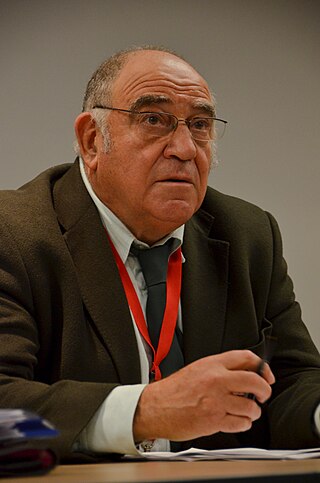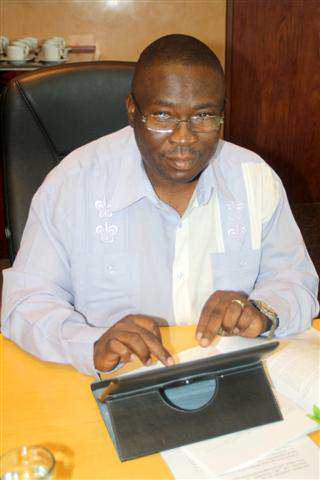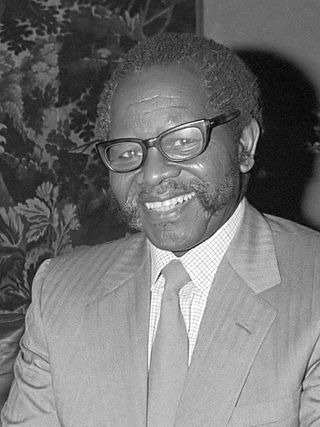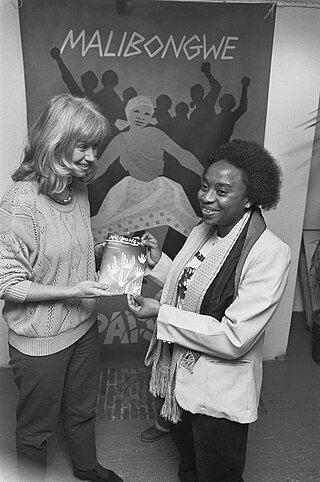Related Research Articles

uMkhonto we Sizwe was the paramilitary wing of the African National Congress (ANC), and was founded by Nelson Mandela in the wake of the Sharpeville massacre. Its mission was to fight against the South African government.

Chris Hani, born Martin Thembisile Hani, was the leader of the South African Communist Party and chief of staff of uMkhonto we Sizwe, the armed wing of the African National Congress (ANC). He was a fierce opponent of the apartheid government, and was assassinated by Janusz Waluś, a Polish immigrant and sympathiser of the Conservative opposition on 10 April 1993, during the unrest preceding the transition to democracy.

Ronald Kasrils is a South African politician, Marxist revolutionary, guerrilla and military commander. He was Minister for Intelligence Services from 27 April 2004 to 25 September 2008. He was a member of the National Executive Committee (NEC) of the African National Congress (ANC) from 1987 to 2007 as well as a member of the Central Committee of the South African Communist Party (SACP) from December 1986 to 2007.

Catch a Fire is a 2006 biographical thriller film about activists against apartheid in South Africa. The film was directed by Phillip Noyce, from a screenplay written by Shawn Slovo. Slovo's father, Joe Slovo, and mother Ruth First, leaders of the South African Communist Party and activists in the Anti-Apartheid Movement, appear as characters in the film, while her sister, Robyn Slovo, is one of the film's producers and also plays their mother Ruth First. Catch a Fire was filmed on location in South Africa, Swaziland and Mozambique.
Radio Freedom also called Radio Zambia was a South African radio arm of the African National Congress (ANC) and its fighting wing Umkhonto we Sizwe (MK) during the anti-Apartheid struggle from the 1970s through the 1990s. It was the oldest liberation radio station in Africa. Listening to Radio Freedom in Apartheid-era South Africa was a crime carrying a penalty of up to eight years in prison.
Peter Mokaba, OLS was a member of the South African parliament, deputy minister in the government of Nelson Mandela and president of the South African governing party's youth wing, the ANC Youth League. The Peter Mokaba Stadium, a Polokwane stadium used for the 2010 FIFA World Cup, was named after him.

Olivia Anne Marie Forsyth , agent number RS407 and codename "Lara", is a former spy for the apartheid government in South Africa. Having attained the rank of lieutenant in the Security Branch of the South African Police (SAP), Forsyth defected to the African National Congress (ANC) and was incarcerated at Quatro prison camp in northern Angola. Following her escape, Forsyth spent six months hiding in the British embassy in Luanda.

Andrew Sibusiso Zondo was an Umkhonto we Sizwe (MK) operative. He detonated a bomb at Sanlam Centre in Amanzimtoti on 23 December 1985, killing five people.
Tryphina Mboxela Jokweni was a female operative of Umkhonto we Sizwe (MK), an armed military wing of the African National Congress (ANC). The ANC is currently the governing party in South Africa. Mrs Tryphina Mboxela Jokweni was popularly known as Mboxela in the neighbourhood. She died of illness at her house at Umlazi Township in the KwaZulu-Natal (KZN) Province at the age of 77 in 2002. Mboxela was the mother of three children.

Amos Fish Mahlalela is a South African politician from Mpumalanga. He has been the Deputy Minister of Tourism since May 2019 and has represented the African National Congress (ANC) in the National Assembly since May 2014. In June 2023, he was additionally elected as the Provincial Chairperson of the ANC Veterans' League in Mpumalanga.

Ayanda Dlodlo is a South African politician and former cabinet minister. A former member of Umkhonto we Sizwe, she became a Member of Parliament for the African National Congress (ANC) in 2009. Thereafter, she was appointed Minister of Communications (2017), Minister of Home Affairs (2017–2018), Minister of Public Service and Administration, and Minister of State Security (2019–2021).
Thenjiwe Mtintso is a South African anti-apartheid activist, politician and ambassador who has held senior positions within the African National Congress (ANC), the South African Communist Party (SACP), and is a veteran of uMkhonto we Sizwe (MK).

Operation Vula was a secret domestic programme of the African National Congress (ANC) during the final years of apartheid in South Africa. Initiated in 1986 at the ANC headquarters in Lusaka and launched in South Africa in 1988, its operatives infiltrated weapons and banned ANC leaders into the country, in order to establish an underground network linking domestic activist structures with the ANC in exile. It was responsible for facilitating the only direct line of communication between ANC headquarters and Nelson Mandela, who at the time was imprisoned and was discussing a negotiated settlement with the government on the ANC's behalf. The operation was disbanded in 1990, after its existence had been publicly revealed and eight of its leaders charged under the Internal Security Act with terrorism and plotting an armed insurrection.
The 48th National Conference of the African National Congress (ANC) took place from 2 to 7 July 1991 at the University of Durban–Westville in Durban, KwaZulu-Natal. It was the first national conference of the ANC since the organisation was banned by the apartheid government in 1960 and marked the ascension of Nelson Mandela to the ANC presidency, which since 1967 had been held by Oliver Tambo.

Mavivi Myakayaka-Manzini, also known as Mavivi Manzini, is a South African politician and diplomat who is currently the South African High Commissioner to Malawi. She was a member of the National Executive Committee of the African National Congress (ANC) between 1994 and 2007 and she was deputy president of the ANC Women's League between 2003 and 2008. During apartheid, she worked in exile in the secretariat of the ANC's women's section; in the 2000s, after one term in the national Parliament (1994–1999), she headed the ANC's international relations desk.

Moe Shaik, also spelled Mo Shaik, is a South African civil servant, diplomat, businessman, and former intelligence operative who has been the South African High Commissioner to Canada since 2022. He is a former chief of the National Intelligence Co-ordinating Committee and a former director of the foreign intelligence wing of the State Security Agency, at that time still called the South African Secret Service.
Janet Yetta Love is a South African civil servant, activist and former politician who has served as vice-chairperson of the Electoral Commission of South Africa since 2018. Before her appointment to the Electoral Commission in 2016, she was a part-time commissioner at the South African Human Rights Commission from 2009 to 2016. She was also director of the Legal Resources Centre from 2006 to 2018.
Jennifer Ann Schreiner is a retired South African politician, activist, and civil servant who represented the African National Congress (ANC) in the National Assembly from 1994 to 1997. She has been a member of the Central Committee of the South African Communist Party (SACP) since 1991 and formerly headed the party's secretariat.
Mzwandile McDonald Masala was a South African politician and former anti-apartheid activist. He represented the African National Congress (ANC) in the National Assembly from 1997 to 2004. He was the South African Ambassador to Zambia from 2004 to 2007.
Flag Marutle Boshielo was a South African anti-apartheid activist, trade unionist, and communist. He went into exile with the African National Congress (ANC) after the party was banned in 1960 and served as political commissar of Umkhonto we Sizwe (MK) from 1969 until his disappearance in 1970. He went missing in August 1970 during an unsuccessful MK operation after his contingent was ambushed. He is presumed to have died in 1970 or soon afterwards.
References
- ↑ Bekker, Jo-Ann (7–13 November 1986), "TEN YEARS AGO", The Weekly Mail
- ↑ "SOUTH AFRICAN GETS 25 YEARS IN BOMBING". New York Times . 7 November 1986. Retrieved 18 November 2015.
- ↑ "Sparg bly oor haar keuse vir ANC-span". Beeld (in Afrikaans). 17 December 1991. p. 2. Archived from the original on 27 September 2007. Retrieved 18 November 2015.
- ↑ "Ebrahim staan aan hoof van GV se administrasie". Beeld (in Afrikaans). 10 August 1994. p. 8. Archived from the original on 27 September 2007. Retrieved 18 November 2015.
- ↑ "Oud-MK-vrou word stadsklerk". Beeld (in Afrikaans). 2 October 1996. p. 4. Archived from the original on 27 September 2007. Retrieved 18 November 2015.
- ↑ Honey, Peter (26 January 2007). "The dirt spreads". Financial Mail. Archived from the original on 5 February 2012. Retrieved 18 November 2015.
- ↑ Jasson da Costa, Wendy (24 May 2007), "NPA chief quits", The Star, p. 6
- ↑ Sparg, Marion; Schreiner, Jenny; Ansell, Gwen (2001). Comrade Jack: The Political Lectures and Diary of Jack Simons, Novo Catengue. STE Publishers. ISBN 978-1-919855-02-8.
- ↑ "Operation Vula: a secret Dutch network against apartheid", Radio Netherlands Archives, September 9, 1999
- ↑ "Hélène Passtoors blikt terug op haar dagen als soldaat naast Mandela" [Hélène Passtoors looks back to her days as a soldier for Mandela]. Humo (in Dutch). 10 December 2013. Retrieved 18 November 2015.
- ↑ "Guido Van Hecken est le nouveau président d'Oxfam-Solidarité". Le Soir (in French). 16 September 2013. Retrieved 18 November 2015.